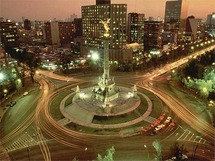
"It aims to place our city where we want to be," Ebrard said, three months after hotel occupancy sunk to record lows as the city shut down to contain the outbreak.
Tourists who show they are staying at one of the city's 460 hotels will have access to medical assistance, not only for A(H1N1) symptoms, but also for accidents or other illnesses, ambulance transport, hospitalization and medicines, Ebrard said.
The cover, administered by the Mapfre company, also includes dental care, repatriations, legal assistance after robberies, lost luggage and delayed or canceled flights.
The sprawling Mexican capital hosts some three million international and four million national tourists each year.
Hotel occupancy sunk as low as 10 percent in April and May and is currently at 59 percent, according to industry groups.
Despite a peak in southeast regions, officials say A(H1N1) is now under control in Mexico, which has reported 138 deaths and some 14,800 cases.
------------------------------------------------------------------------------------------------------------------------
Tourists who show they are staying at one of the city's 460 hotels will have access to medical assistance, not only for A(H1N1) symptoms, but also for accidents or other illnesses, ambulance transport, hospitalization and medicines, Ebrard said.
The cover, administered by the Mapfre company, also includes dental care, repatriations, legal assistance after robberies, lost luggage and delayed or canceled flights.
The sprawling Mexican capital hosts some three million international and four million national tourists each year.
Hotel occupancy sunk as low as 10 percent in April and May and is currently at 59 percent, according to industry groups.
Despite a peak in southeast regions, officials say A(H1N1) is now under control in Mexico, which has reported 138 deaths and some 14,800 cases.
------------------------------------------------------------------------------------------------------------------------









 Home
Home Politics
Politics









